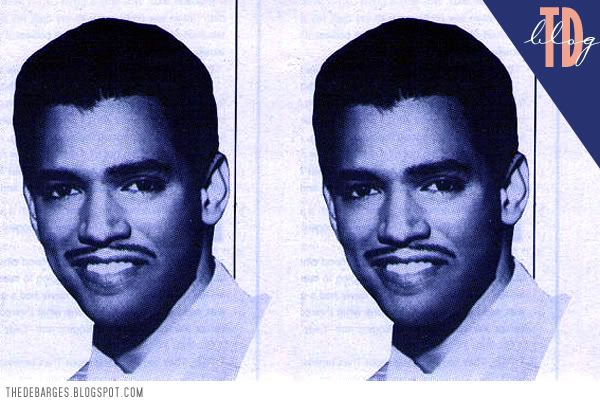
A MOTOWN deal in their teens, a string of hit records---'All This Love', 'I Like It', 'In A Special Way', 'Rhythm Of The Night' -- by the mid-eighties, and a popular, distinctive lead vocalist set fair for a soaraway solo career: DeBarge could have been another Jacksons.
But, by 1984, they had disbanded, brother James securing for himself a dubious reputation courtesy some unfortunate extra-curricular activities (see former spouse, Janet Jackson for details), and frontman, El, saw out the decade along, his two solo albums for Barry Gordy reflecting the decline in the great entrepreneur's business fortunes. The kind of loose ends that take some re-weaving.
1992 finds El DeBarge signed to Warner Bros, not so much newly signed, since the deal was struck back in '89, but, one the evidence of 'In The Storm', inspired afresh. He's now 30 years old, still baby-faced, but no longer the innocent startled by his own teen sex symbol image. In short, he's grown up:
"You know," reflects El on the subject "Prince sent me a tune for the album, 'On the Tip O' My Tongue', 'cause he wondered how the public would take to me singing a dirty song. Well, I did the tune 'cause I loved the groove and because it was Prince, but he obviously had no idea of where the rest of 'In The Storm' was coming from, I mean, I wouldn't wanna be lewd when my records are being bought by teenagers and kids, but I don't mind talking about sex, I like it! I'm not fool, ya know."
That much we knew. The first job El secured at Warners was a guest slot on Quincy Jones' 'Back on the Block' LP, writing lyrics for and singing alongside James Ingram, Al B Sure! and Barry White on 'The Secret Garden'. The next was to make his own album, forming a close knit band for the purpose and writing some tunes that would reflect his newly mature outlook on life. That's probably why it took him two-and-a-half years.
Time to make an obvious point. Containing a new version of 'After the Dance', a sleeve design (vaguely) reminiscent of 'I Want You' and more lines and samples from Marvin himself than you could shake a stick at, 'In The Storm' reflects a certain Gaye influence in El's music. He isn't so foolish as to deny this, but contends, not entirely convincingly: "It's important that I don't come off as lost in Marvin, 'cause I do have my own identity..."
"When I'd finished the album, I took it into Warner Bros. and we sat down and listened to it, and something was missing. At first we couldn't figure out what. So I said, 'Look, I know you just spent a lot of money already on my album, but I heard the company had just signed Maurice White and if you could spend just a bit more and allow him to look over what we've done, then maybe we can pull something out.' And that was exactly what we needed. Maurice, being from the old school, paid some attention to presentation and suddenly we had a much better album."
Admirable as it is, 'In The Storm' will have fulfilled its task if it restores the DeBarge name to the American industry's good books. For, as you read this, James, Bobby and Chico DeBarge are all engaged in setting up solo deals, and there is talk of another group shot by the year's end. The latter is still close to El's heart:
"Not one of us is strong on his own than we are together as a group. We left alot of things unfinished. I guess the pressures and demands of the record company got to us. As we grew up, we grew apart. But that's the past. Now we know we can handle whatever the business throws up. We know exactly what to do about that."
Written by Chris Wells for Echoes Magazine, 1992.
Transcribed for the web by thedebarges.blogspot.com









No comments:
Post a Comment